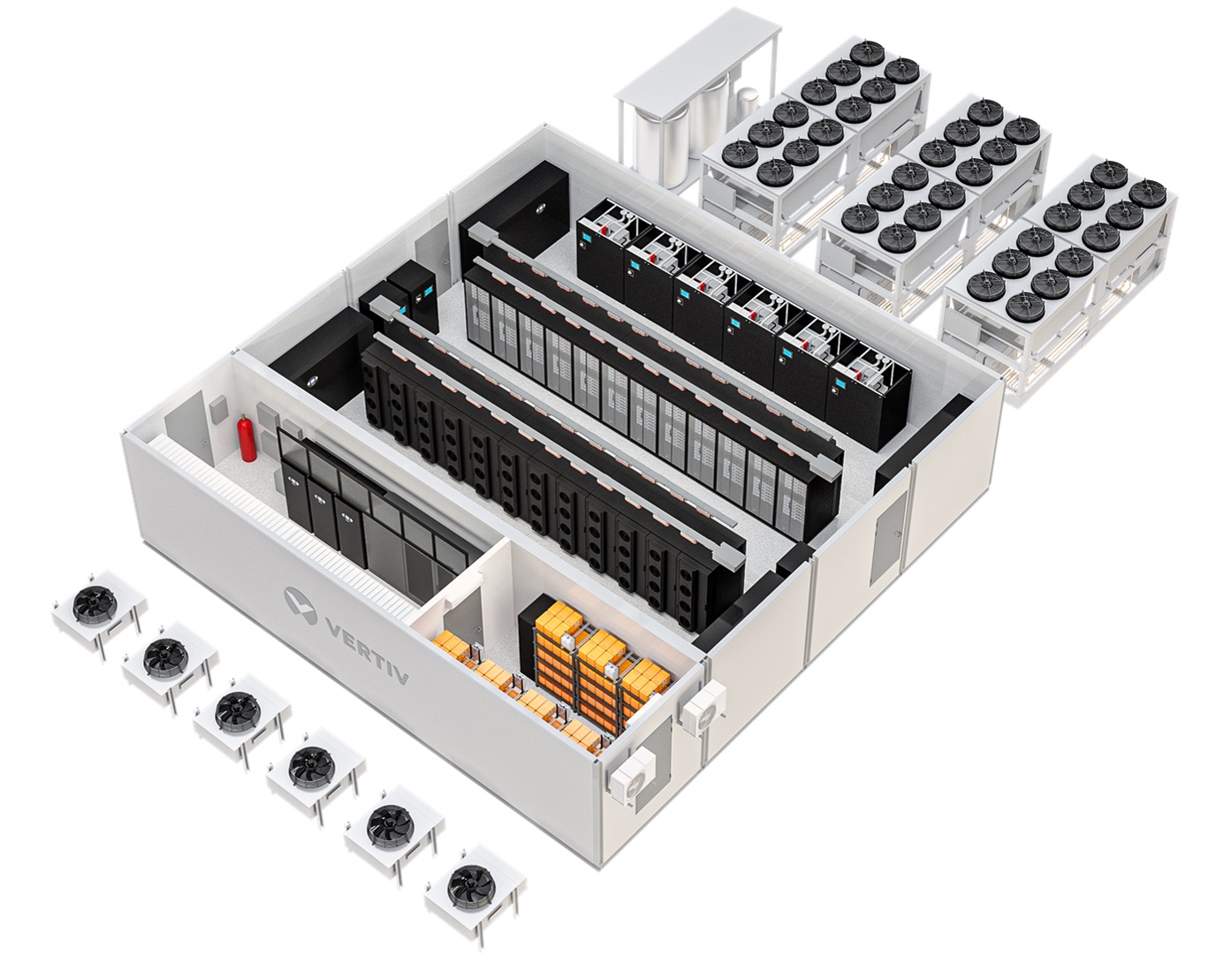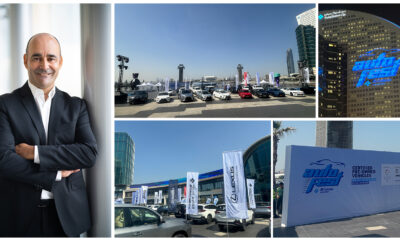Tech Interviews
Privacy, Trust and Security: Cornerstones of Urban Futurism
Internet of Things (IoT) is transforming the way we live and transact as a society. With the number of connected devices proliferating, cyber threats will increase as cybercriminals have a lucrative target. Gordon Love, Vice President, EMEA Emerging Region, Symantec tells The Integrator what precautions businesses and end-users can take with these smart devices.
Q1. How will Internet of Things transform the way we live?
A1. Internet of Things (IoT) has already transformed the way we live today and will continue to do so as we adopt more and more internet-connected devices. While new IoT devices can bring great benefits to our everyday lives, they also have the potential to become serious security risks and can be an easy and lucrative target for cybercriminals. Whether through fitness trackers and routers to home security systems, smart TVs and baby cameras, cybercriminals are starting to pay attention and threats are on the rise.
Cybercriminals are interested in cheap bandwidth to enable bigger attacks. They obtain this by hijacking our devices and stitching together a larger web of consumer devices that are easy to infect because they lack sophisticated security. All they need to do is pre-program their malware with commonly used and default passwords, allowing them to easily hijack device passwords.
As we see more and more consumer devices being hijacked because they are connected to the internet and their default device passwords have not been changed, a bigger emphasis on securing these devices is needed. According to Symantec’s Internet Security Threat Report published earlier this year, IoT devices continue to be ripe targets for exploitation. Symantec found a 600 percent increase in overall IoT attacks in 2017, which means that cyber criminals can exploit the connected nature of these devices.
Q2. There is a proliferation in the number of smart devices across the globe, including smart homes, increasing the surface and vulnerability to cyber-attacks. What security hygiene must be followed to mitigate these threats?
A 2. Security varies a lot with different smart devices, so it is difficult to give generic advice to users. It is important that users remain vigilant when installing smart home devices and make sure that the device configuration settings are understood.
Here are a few points to consider when installing smart devices, which can also be used for home as well:
• Use strong and unique passwords for device accounts and Wi-Fi networks
• Change default passwords
• Use a stronger encryption method when setting up Wi-Fi networks, such as WPA2
• Disable or protect remote access to IoT devices when not needed
• Use wired connections instead of wireless, where possible
• Use devices on a separate home network, when possible
• Be careful when buying used IoT devices, as they may have been tampered with
• Research the vendor’s device security measures
• Modify the privacy and security settings of the device to your needs
• Disable features that aren’t needed
• Install updates when they become available
• Ensure that an outage, for example due to jamming or a network failure, does not result in an unsecure state of installation
• Verify if smart features are really required or if a normal device would be sufficient
Q3. What is ambient security and how does it help secure IoT?
A3. An ecosystem of devices, which we call “ambient computing”, offers a theoretical hope that we can change the game of security for IoT, and move closer to the long-term goal of absolute cyber security in the Internet of Things era.
This is how this work. Imagine if your device was connected to a cloud-based service that delivered “always on” security? What’s more, the device wouldn’t be able to connect to anything except through that particular security service, which would offer full protection against any imaginable cyber-attacks cooked up by the bad guys.
This isn’t fantasy. We already do something similar for laptops, smartphones, and tablets with “firewall as a service” offerings. Many enterprises also use cloud-based services with global deployments of security hardware so that wherever they connect, employees are connecting through these security sites.
Some may be connecting over an untrusted local connection but that’s why those services set up a “personal” crypto connection, thus eliminating the need to trust a particular local network. What’s more, everything is encrypted from the device to a secure site, which deploys security hardware to protect users from potential attack.
Of course, firewalls aren’t enough. That’s why such services need full proxies and careful “key management.” That allows the security hardware to even defend against attacks tunneling through encrypted web connections. Fortunately, this exists today in commercial services like Symantec’s Web Security Service (WSS).
Q4. What can be done to ensure a strong and secure foundation for urban futurism?
A4. Today, and into the future, the Internet of Things (IoT) will continue to see humanity take a new foundation (the Internet) and use it to build things that fundamentally change the way we live our lives.
It is difficult not to get excited about self-driving cars that learn from each other, connected homes that allow us to remotely monitor and control our personal spaces and smart meters that have a profound impact on a nation’s energy consumption. But, there are likely to be unintended consequences to all of these ideas that technologists (even the really clever ones) are likely to miss given the current drive for innovation that is being encouraged by both the private and the public sector.
At Symantec, our primary concerns with regard to urban futurism have to do with personal privacy, trust and the security of systems and information. Interestingly (and with a few exceptions) a great number of the technologies needed to facilitate a trust-worthy and secure IoT already exist. Now, a great deal of work needs to be done to push this forward and to create working frameworks within which we can all operate and collaborate to create useful and trustworthy solutions that
Tech Interviews
Daikin’s Innovative Cooling Solutions for Data Centers and Infrastructure

Integrator Media had an exclusive interview with Ayush Dubey, Dy. General Manager – Applied, Daikin Middle East and Africa
Given Daikin’s recent partnerships with OFPPT and Almoayyed Contracting Group, what are your objectives and anticipated outcomes you look to achieve in the future?
Partnering with institutions like OFPPT is more than just our go-to-market strategy for advancing HVAC-R after sales service. With their solid network and our shared vision, we aim to penetrate the Moroccan HVAC-R industry and promote sustainable cooling practices. Our aim is to educate the local market and its users to build a new generation of highly skilled workforce for the HVAC-R industry, contributing significantly to Morocco’s socio-economic development. This aligns with Daikin’s vision of providing customers with the best service quality in their respective local markets while also driving towards more energy-efficient and sustainable products. Through partnerships with vocational training programs like OFPPT in Morocco, we will create a high-quality talent pool through advanced training in the installation and maintenance of high-efficiency HVAC equipment and solutions, which is a critical component over the operational lifetime of the equipment. While the UAE is the powerhouse, KSA, Qatar, Nigeria, and Egypt are our focused markets for the coming years. Nurturing and empowering advanced skills of the local talent and youth is core to any and every step of our expansion program in the region. Similarly, our strategic alliance with Almoayyed Contracting Group underlines our common goal towards customer satisfaction and advancing sustainable and innovative HVAC solutions in Bahrain. We are committed to local citizenship by being receptive of the needs of the communities across the region. Almoayyed Contracting Group’s capabilities in technical support and maintenance services will further reinforce this commitment to customer satisfaction.
What type of HVAC solutions Daikin plans to introduce to the Bahraini market, and how these solutions cater to the needs of data centers and critical infrastructure?
The partnership has seen the introduction of a wide range of Daikin products and services in Bahrain, including Direct Expansion (DX) Air Conditioning, Applied, Refrigeration and various other solutions tailored to meet the unique requirements of the market. We offer vast range of solutions from 1 TR to 3000 TR unit capacity coupled with airside equipment, controls for plant optimization and commercial and industrial refrigeration plants. When it comes to data centers, we have very reliable high efficiency air-cooled chillers operating on Refrigerant cooled VFDs utilizing low GWP refrigerant R1234ze. These chillers have inbuilt redundancy, that is very critical for Datacenter application, equipped with advance control algorithm that provides seamless integration to any BMS system. The control algorithm allows the chillers to achieve full load within 180 seconds after power failure and have options such as free-cooling. All chillers are AHRI certified for performance and have operational capability of upto 55°C ambient. We also offer CRAH units manufactured in our Middle East factories and for airside applications in Datacenter. Daikin also provides Redundant PLC systems that optimize complete chiller plant operation to provide maximum benefits to customer.
With the introduction of Daikin’s advanced HVAC solutions, what future trends or changes do you foresee in the data center and infrastructure landscape in Bahrain?
Datacenters cooling requirements are continuously evolving thanks to improvement in server and hardware technologies. Water temperatures required for air handlers cooling IT equipment are at higher temperatures allowing usage of water-economizers (Free-cooling) even in the prevailing weather conditions of the Middle East. These overall improves the power usage effectiveness (PUE) of datacenters. New server cooling methods such as liquid cooling further improves efficiency of the system. On controls side, implementation of predictive analytics to optimize cooling requirement and hot and cold aisle airflow management supports in overall sustainability and carbon footprint reductions.
How the Packaged Air Conditioners for Facilities & Factories contribute to data center energy efficiency?
Daikin provides complete packaged chillers with each component and controls optimized to deliver best performance for the requirement. The chillers utilize R1234ze low GWP refrigerant that also has better thermodynamic properties while operating at datacenter conditions compared to traditional refrigerant. The compressors are refrigerant cooled that provide maximum reliability and redundancy for operation in harsh Middle East environmental conditions. The free-cooling coils are also completely factory packaged along with integrated controls for field operation. The entire chiller package is tested at simulated design condition to demonstrate committed performance ensuring customer peace of mind once chillers are delivered and installed at site.
How does Daikin’s advanced cooling solutions address the unique thermal management challenges in data centers?
Data centers have stringent requirements on precise temperature and humidity control and our solution offering of CRAH and CRAC units are designed to provide such level of controls. Moreover, Daikin chillers are with inverter with stepless capacity control allowing more accurate water temperature controls and this combined with our advance integrated controls such as iPlant Manager and redundant PLC control achieve these conditions more efficiently.
How Daikin’s RapidRestore technology enhances the reliability of data center cooling systems during power outages?
Daikin’s RapidRestore technology is designed to bring cooling systems back online quickly after a power outage reducing downtime ensuring thermal parameters are maintained within datacenters. The technology comes equipped with inbuilt UPS for controls that does not require unit controller to reboot during power failure and is able to achieve full load on the chiller within 180 seconds. The entire process does not require any manual intervention and is automated to ensure swift and efficient return to normal operations.
Tech Interviews
Exploring Infobip Core Offerings and Strategic Expansions

Integrator Media had an exclusive interview with Amsal Kapetanović, Country Manager KSA, Infobip
Describe Infobip and its core offerings.
Infobip is a global cloud communications platform that enables businesses to build connected experiences across all stages of the customer journey. Accessed through a single platform, Infobip’s omnichannel engagement, identity, user authentication and contact centre solutions help businesses and partners overcome the complexity of consumer communications to grow business and increase loyalty. With over a decade of industry experience, Infobip has expanded to 75+ offices globally, and offers natively built technology with the capacity to reach over seven billion mobile devices and ‘things’ in 6 continents connected to over 9,700+ connections of which 800+ are direct operator connections. We provide a broad range of capabilities at scale. These include our omnichannel and CPaaS capabilities, contact center solution, AI-powered chatbot building platform, customer engagement solution, customer data platform, identity and security solutions, and telco solutions. In 2023, Infobip was named a Leader in the Gartner Magic Quadrant for Communications Platform as a Service (CPaaS).
Infobip recently launched your first data center in Saudi Arabia, can you elaborate on the significance of this move?
This significant milestone reflects Infobip’s commitment to expanding its presence in the Middle East and strengthening its infrastructure to better serve clients in KSA and the neighbouring countries. Infobip launched its first data centre in KSA, to host and process the data within the country, in line with international data security standards. The data centre in Riyadh is expected to support businesses, create numerous job opportunities, and contribute to the local economy. It offers scalability and reliability to meet the evolving needs of businesses across various industries.
Another recent development is Infobip’s partnership with Oracle as an independent software vendor. How will this collaboration empower businesses to leverage communication solutions?
Recently, we enhanced our relationship with Oracle by becoming an Independent Software Vendor, or ISV, with access to Oracle Integration Cloud. This means that businesses using any Oracle solution can access Infobip’s omnichannel platform through Oracle Cloud Marketplace (OCM). With the ability to integrate our full omnichannel communications platform across any Oracle solution, available through OCM, we can help enterprises, no matter their sector or use case, create conversational experiences that increase conversions, boost sales and drive loyalty. Infobip will be building additional integrations through the Oracle Integration Cloud.
Infobip unveiled an AI Hub for AI-driven customer experiences. Can you explain how AI is transforming the way businesses interact with their customers?
Our AI Hub solution enables businesses and brands to build end-to-end conversational customer journeys, enhancing customer engagement whether for marketing, sales or support and driving business growth with minimal effort and no coding knowledge. In general, it supports digital transformation by integrating advanced analytics, AI, and generative AI features with Infobip’s core Software-as-a-Service (SaaS) portfolio. Infobip collaborated here with Microsoft to develop new ways of integrating generative AI within its customer engagement suite and offer even more conversational experiences to consumers. We integrated OpenAI’s ChatGPT model through Microsoft Azure OpenAI Service into our Infobip AI Hub
What are Infobip’s plans for further growth and innovation in the Middle East, particularly in Saudi Arabia?
Our plan is to expand in locally hosted state of the art engagement solutions that will bridge the gap between customers internal ecosystems that are existing on their app and web experiences, and 3rd part channels like WA for business and other OTTs, SMS, Voice, Email, etc. On innovation side of things, we are introducing our Ai orchestrator, that is already helping customer combine multiple bot systems, GenAi bots that are working in conjunction with rule-based bots and other intent engines to get the desired results that customers cannot achieve using only one bot variant.
Tech Interviews
Vertiv Expands Liebert GXT5 Line with New Lithium-Ion UPS Models

Integrator Media had an exclusive interview with Nassif Yazbeck, Channel Sales Director – METCA, Vertiv
Introduce this technology – Vertiv Liebert GXT5 Lithium-Ion UPS system – what it is all about?
Vertiv recently introduced the extension of the Vertiv Liebert GXT5 Lithium-Ion double-conversion, on-line uninterruptible power supply (UPS) system for 5kVA-10kVA Global Voltage (GV) (200V-240V; Default 230V) applications. This expansion of the Liebert GXT5 Lithium-Ion line to 10kVA (from 1-3kVA) further rounds out the Vertiv portfolio of lithium-ion UPS systems and solutions for the edge of the network. Lithium-ion technology delivers two to three times the useful life of lead-acid batteries along with a lower total cost of ownership, making the Liebert GXT5 Lithium-Ion online UPS ideally suited for network and server rooms, and other mission-critical edge applications.
How does the Vertiv Liebert GXT5 Lithium-Ion UPS system for 5kVA-10kVA applications address the specific needs of data centers?
The Liebert GXT5 Lithium-Ion models are designed for the smaller spaces typical of the network edge, with a convertible rack/tower design and only a 3U (5kVA to 10kVA UPS) rack height. These systems include an integrated maintenance bypass cabinet preserving additional rack U-space. All Liebert GXT5 Lithium-Ion UPS systems come with a five-year limited warranty. Here are their key features that make them ideal for network edge:
- • High-Performance Battery Technology with Lithium-ion batteries lasting up to three times longer than VRLA batteries. They offer 20 to 50 percent more runtime compared to VRLA batteries, making them ideal for mission-critical applications.
- • Space-Saving Design as the Liebert GXT5 models are designed for smaller spaces typical of the network edge.
- • Lower Total Cost of Ownership (TCO) with up to a 50% lower TCO compared to traditional UPS systems.
- • Intellislot and Network Connectivity as the UPS includes an Intellislot with a pre-installed network card which allows for remote monitoring, management, and alerts, enhancing overall reliability and efficiency
With lithium-ion batteries lasting eight to ten years, compared to the three to five years for VRLA batteries, how does this impact the total cost of ownership and maintenance schedules for data center operators?
The longer lifespan of lithium-ion batteries results in lower replacement costs over time. Data center operators can avoid frequent battery replacements, reducing the overall TCO. Additionally, lithium-ion batteries have lower maintenance costs due to their reliability and reduced need for regular maintenance activities.
In addition, with VRLA batteries, data center operators must plan for more frequent replacements, which can disrupt operations and require additional labor. In contrast, the extended lifespan of lithium-ion batteries allows for longer intervals between replacements. Maintenance schedules can be adjusted to align with the longer battery life, resulting in fewer service interruptions and reduced operational downtime.
Fewer battery replacements translate to less waste and a reduced environmental footprint. Proper disposal and recycling of batteries are essential, but the overall impact is still lower with lithium-ion technology.
What role does the Liebert GXT5 Lithium-Ion UPS system play in enhancing the sustainability and energy efficiency of data centers?
Liebert GXT5 Lithium-Ion UPS helps with the following to enhance the energy efficiency of data centers:
Operating Temperatures:
The Liebert GXT5 Lithium-Ion UPS is designed to perform even in higher operating temperatures. Unlike traditional valve-regulated lead-acid (VRLA) batteries, which can be sensitive to temperature fluctuations, lithium-ion batteries demonstrate better performance and reliability across a wider temperature range. This resilience allows data centers and edge sites to operate efficiently in various environmental conditions, including those at the network edge where temperature control may be challenging.
Battery Life Expectancy:
One of the standout features of the GXT5 UPS is its longer battery life expectancy. Lithium-ion batteries typically last up to three times longer than VRLA batteries. The extended lifespan translates to fewer battery replacements over the life of the UPS, reducing operational disruptions and maintenance costs. Data center operators benefit from lower total cost of ownership (TCO) due to reduced replacement expenses.
Energy Efficiency:
The Liebert GXT5 Lithium-Ion UPS offers high efficiency in both online mode and Active ECO mode. This efficiency minimizes energy waste and contributes to overall energy savings. By using lithium-ion technology, data centers can optimize power protection while maintaining a focus on sustainability.
How is Vertiv positioning itself to capitalize on the expected rapid growth of lithium-ion battery adoption in data centers?
The Liebert GXT5 Lithium-Ion UPS offers compactness, versatility, and low-maintenance, presenting an efficient solution perfectly suited for remote sites with minimal onsite technical support. With this expanded offering, Vertiv is poised to capitalize on the expected rapid growth of lithium-ion batteries. Vertiv recognizes the increasing importance of managing energy consumption and reducing carbon footprints in data centers. As data centers are estimated to be responsible for up to 3% of global electricity consumption (projected to touch 4% by 2030), governments are scrutinizing their resource usage. Vertiv’s experts expect increasing regulatory oversight in the near future, prompting the industry to self-monitor and adopt environmentally friendly practices.
Lithium-ion batteries offer several advantages over traditional lead-acid batteries, including greater life expectancy, more runtime (for a given battery power density), quicker recharge time, and better performance at higher temperatures.
-

 Tech Interviews4 months ago
Tech Interviews4 months agoNavigating the Cybersecurity Landscape in Hybrid Work Environments
-

 Features2 months ago
Features2 months agoSecurity in the Cloud Age: Combating Risks with Hybrid Cloud Solutions
-

 Tech Features6 months ago
Tech Features6 months agoHow Telecommunications Providers Can Best Tackle DDoS Attacks
-

 Tech Features1 month ago
Tech Features1 month agoThe Middle East to Lead with Next-generation Mission Critical Communication Advancement
-

 Automotive5 months ago
Automotive5 months agoAl-Futtaim Automotive Builds On 23-Year Legacy of Trust & Leadership in UAE’s Pre-Owned Car Market to Sell Over 25,000 Used Vehicles in 2023
-

 Tech News7 months ago
Tech News7 months agoSenet enters MENA’s Competitive Gaming Scene with ‘skill-to-earn’ Platform
-

 Tech News6 months ago
Tech News6 months agoGoogle Appoints Ziad Jammal as Google Cloud Country Manager in the United Arab Emirates
-

 Tech News4 months ago
Tech News4 months agoBrighton College Abu Dhabi and Brighton College Al Ain Donate 954 IT Devices in Support of ‘Donate Your Own Device’ Campaign











